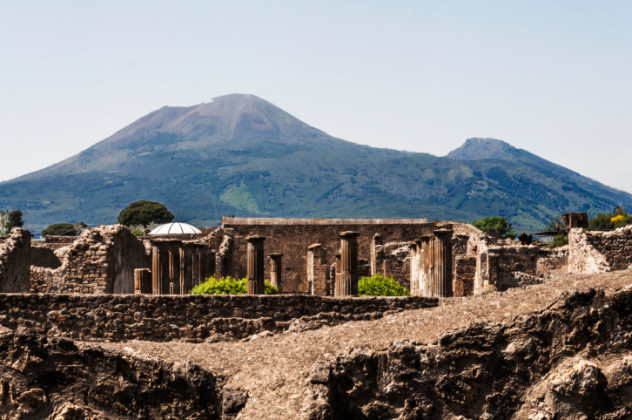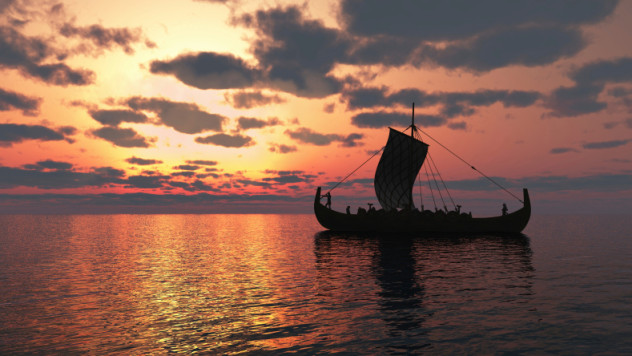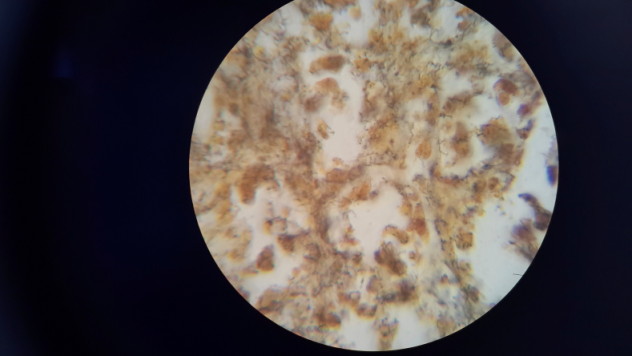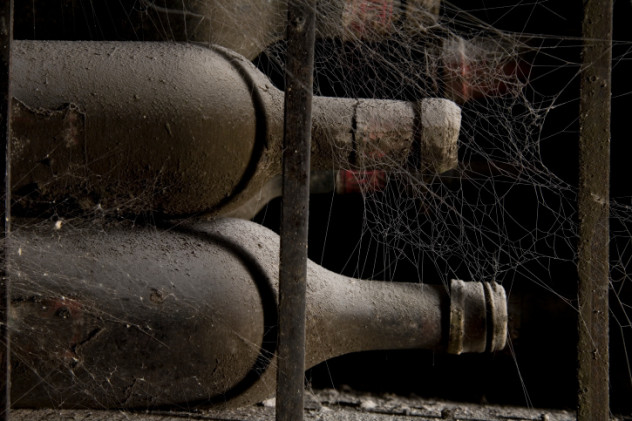(单词翻译:单击)
For all we like to romanticize the past, the truth is that most of our shared history was less "awe-inspiring" and more "vomit-inducing."
人们习惯于美化过去,但事实是人类的过去并不是那么令人惊叹的。相反,它常常会让人感到恶心。
10.Pompeii Was One Giant Garbage Dump
10.庞培是个巨型垃圾堆

Before it got buried under a cloud of ash, Pompeii was the ancient equivalent of the French Riviera. It was a place where rich Romans came to unwind after some hard empire-building. But there was one crucial difference between ancient Pompeii and a modern resort town: Pompeii was absolutely overflowing with garbage.
在被灰烬掩没之前,古时候的意大利城市庞培相当于现在的法国里维埃拉。庞培过去是一个吸引富有的罗马帝国建造者在经历艰辛的帝国建造时期后到此放松的疗养胜地。但古时候的庞培有一点和当代的旅游胜地大不相同,就是前者垃圾泛滥。
Instead of having a waste collection program, or even rudimentary landfills, the people of Pompeii just dropped their trash wherever they felt like it. Streets, alleys, and even cemeteries were filled with broken pottery, building remains, uneaten food, and horse carcasses. Get off the street and things were no different. There's plenty of evidence that locals treated their houses like one giant trash can, with the fossilized remains of rotting food found littering floors and piled up alongside drinking water. According to Allison Emmerson of the University of Cincinnati, trash was regarded as just a fact of life in Pompeii. Even the tombs of ancestors were considered an acceptable place to dispose of waste. That undoubtedly made the city stink to high heaven in the summer months.
在庞培,人们把垃圾随意倒置在他们想倒置的地方,而不是建立垃圾填埋场来处理它,更别说完善的废物收集系统了。这使得大街小巷甚至是墓地上都堆满了陶瓷碎片、建筑残垣、剩饭剩菜还有马的尸体。即使离开街道回到家,垃圾也还是到处乱扔。许多证据表明,当地人把他们的家当作一个巨型垃圾桶,任由腐蚀掉的食物挥洒在地面上或者任由它们堆积在饮用水附近。据辛辛那提大学的艾里逊·埃默森表示,当时的庞培垃圾被看作是与人们生活非常密切的一部分。甚至连祖先的墓地也能被接受成为堆放垃圾的地方。这无疑使夏季的庞培臭气冲天。
9.The Vikings Were Plagued With Parasites
9.被寄生虫折磨的维京人

It's no surprise that Viking life was hard. With Vikings spending a lot of time on ships sailing rough northern seas during one campaign of conquest or another, no one would picture their lives as anything other than difficult. Even the most cynical person would likely miss one key detail, though: Viking guts were utterly infested with parasites.
我们都知道维京人的生活十分艰苦。于是,为了生存,维京人将他们的大部分时间都花在船上,面对着波涛汹涌的大海,一次又一次地游走在征服的途中。除了艰苦,人们实在不知道用别的什么词来形容维京人的生活了。但即使是最具怀疑精神的人也很可能忽略了一个重要的细节,维京人的肠子里满是寄生虫。
Thanks to a culture which promoted close living with livestock, most Vikings were exposed to a whole load of nasties from a very early age. By the time they reached adulthood, their insides were crawling with the sort of creatures H.P. Lovecraft had nightmares about. Researchers who studied Viking poop have found eggs indicating chronic roundworm and liver fluke infections. Worst of all, there was evidence of whipworm. Found in piles of Viking feces dating back to 1018, whipworm would have made the Viking's lives unbearable. Aside from severe diarrhea and acrid-smelling farts, those infected could've expected painful passage of stool, growth retardation, and impaired cognitive development.
因为对与牲畜密处的文化的倡导,大多数维京人很小就在脏兮兮的环境里长大。在他们成年后,维京人的肚子里已经爬满了让霍华德·菲利普斯·洛夫克拉夫特做噩梦的生物。研究者在维京人的粪便中发现一些寄生虫卵,表明他们深受慢性蛔虫病和肝脏吸血虫病的困扰。更糟的是,还有证据表明鞭虫也是困扰他们的疾病之一。从可能追溯到1018年的维京人的排泄物中发现,鞭虫会使维京人的生活难以忍受。除了严重的腹泻和放刺激性气味的屁的症状,患有鞭虫病的人还会有大便吃力、生长迟缓以及认知发展受损等问题。
8.Medieval London Stank To High Heaven
8.中世纪的伦敦臭气熏天

Let's say you decide to skip the obvious places and take your time machine on a trip to medieval London. You'd probably be prepared for the city to be dirtier and smellier than it is now. But you might not be prepared for exactly how big a difference it would be. To be blunt, London in the Middle Ages stank to high heaven. The streets were filled to overflowing with excrement, and people routinely dumped rotting food and animal entrails out in the open to fester. In some places, this foul mixture was so deep the streets were effectively impassable.
如果你打算掠过那些显而易见的地方,那么请乘坐时间机器回到中世纪的伦敦吧。你或许能够做好心理准备,接受中世纪的伦敦比现在的伦敦差太多。但是!你绝对想不到那时候的伦敦会脏成那个样子。事实就是这样,中世纪的伦敦臭气弥漫。动物粪便满大街都是,人们习惯性地把腐烂的食物和动物内脏往街上倒,任由它们继续腐烂。甚至有的地方被这些垃圾堆得老高,以至于行人不能轻松通过。
Things were no better by the river. Butchers threw rotting meat into the Thames, and blood was left to congeal on the banks in the sun. By the 14th century, the stench was so great the king was forced to ban the slaughtering of animals inside the city. To top it all off, tanneries were working around the clock to boil leather, producing a stench that suffocated the entire city.
即使是在河边,环境也并没有因为饮用水源的原因而好一点。屠夫习惯把腐烂掉的肉直接丢进泰晤士河,腐肉残留的血在阳光的作用下凝结在河岸上。在14世纪,伦敦的臭味迫使国王下令禁止城里的动物屠宰。最严重的是制革厂日夜不停地炼制皮革,煮沸皮革的臭味足以窒息一整个伦敦。
7.Renaissance Europe Was Crawling With Syphilis
7.梅毒猖狂的文艺复兴时期的欧洲

The words "Renaissance Florence" evoke images of absurdly dressed men wandering around pristine cities, solving great mysteries, and inventing the scientific method. What they don't evoke are images of syphilitic beggars writhing in agony in the streets, their faces falling apart before onlookers' eyes. Yet, that's exactly what Michelangelo or Da Vinci could expect to see strolling through town.
"文艺复兴时期的佛罗伦萨"使人们联想到穿着荒唐的男士,他们游走在城市整洁的街道上,解决着一个又一个谜题,想出一个又一个解决问题的科学方法。却没让人想到佛罗伦萨街上痛苦地蜷缩抽搐着的患有梅毒的乞丐,他们在路人面前也完全无法顾及形象,任由扭曲的面孔损失自己的形象。但这确实是米开朗琪罗和达芬奇踱步于此时所看到的现象。
In 1495, a group of French soldiers returning from the New World had brought with them an unexpected treat. Known today as syphilis, the disease was the Renaissance equivalent of the AIDS pandemic but even scarier. The symptoms were terrifying. Weeping pustules would explode across people's faces, hair would fall out and—in the worst cases—the flesh would be eaten away right down to the bone. And since there were no hospitals or care homes to speak of, those that caught the dreaded "French disease" were left to suffer out in the open. As a result, Renaissance society was caught in a state of permanent panic about the grotesque effects of fornication. Contemporary accounts are filled with a paralyzing dread at the thought of becoming infected, and woodcuts display horrific examples of the disease. The whole of Europe was either afraid, infected, or both.
1945年,一队从新大陆回来的法国人在回家的同时给欧洲带来了一个"意外的惊喜"。文艺复兴时期的梅毒病菌相当于现在的艾滋病病毒,但更可怕。梅毒患者的特征十分可怕。流脓的脓包会慢慢长满患者的整张脸,头发也会渐渐掉光。最糟糕的是,最后患者的皮肉都会被腐蚀掉,只剩下骨头。因为当时并没有医院或者医疗站让人们去寻求帮助,所以在当时不幸患有这个可怕的"法国病"的人就只好被丢弃在大街上,任由他自生自灭了。所以,文艺复兴时期的欧洲人长期被笼罩在这种恐惧当中,以至于没有人敢冒着患上梅毒的风险去通奸。当代的文字记录也充满了对染上梅毒的恐惧。木版画也呈现了许多梅毒患者的图像。整个欧洲的人不是已经染上梅毒就是在每天担心自己会染上梅毒。
6.Ancient Greek Wine Was Really Disgusting
6.超级恶心的古希腊葡萄酒

Wine was a big deal in ancient Greece. People wrote poems to the stuff, they had their own god of wine, and Homer even used it as a metaphor to describe everything from animals to the ocean. So, the first thing you'd do in ancient Athens is sample this wonderful drink, right? Only if you wanted to completely destroy your taste buds. Ancient wine was disgusting.
葡萄酒在古希腊是一种十分重要的东西。诗人非常喜欢为葡萄酒写诗,每个诗人都有自己最爱的葡萄酒。诗人荷马甚至用葡萄酒比作一切出现在他诗里的事物,从动物到海洋。那么,当你回到古代雅典的第一件事就是小尝一口这个神奇的饮料,对吗?如果你想彻底毁了你的味蕾,就去吧。古时候的葡萄酒是超级恶心的。
The trouble was no one had yet figured out how to preserve wine for long periods, and ancient vintners tried all sorts of bizarre tricks. It wasn't unusual to find resin or marble dust added to wine at the vineyard, with salt and lead being two other favorites. Some simply gave up fighting nature, and they left their wines outside to oxidize until they were bursting with bacteria. As a result, wine was usually either a thick, tar-like substance we would consider undrinkable or a glass of bug-infested vinegar. Bad as all this is, it got even worse when it came time to drink the wine. Ancient Greeks would frequently cut their wine with seawater to make it more "palatable."
这是因为古时候没有人能够想出长期保存葡萄酒的方法,酿酒商甚至尝遍了所有奇怪和不奇怪的方法。有些葡萄园主很喜欢在葡萄酒里添加树脂和大理石灰,烟和石磨也是两种很受人们欢迎的两种葡萄酒保鲜剂。有的人干脆放弃与大自然做斗争,让葡萄酒自然氧化直到它们产生细菌为止。于是,古时候的葡萄酒通常要么是一团不能喝的厚厚的焦油状的东西,要么是一杯滋生虫子的醋。这些都很恶心,但更恶心的是人们喝葡萄酒的方式。古希腊人常常在葡萄酒里加一点海水,想要使它们更加可口。
翻译:哈利小王子 来源:前十网


